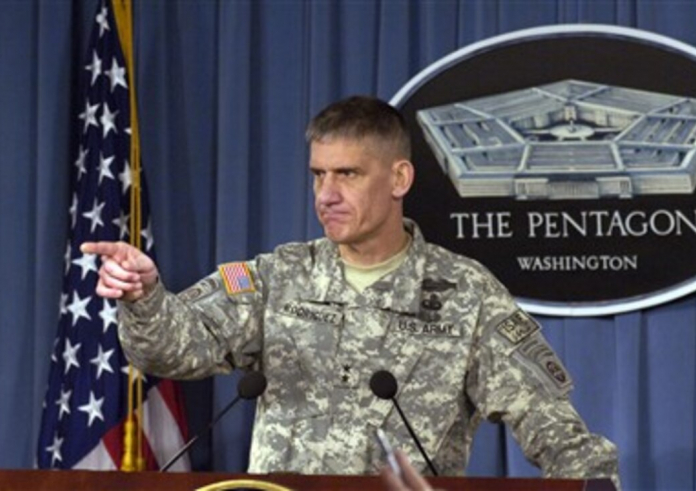
by : Shoshana Bryen , Newsweek
Government-to-government relations between Israel and the United States are shaky for reasons the American government periodically makes clear. By contrast, there is a clear understanding between the militaries of both countries that their relationship is ongoing and mutually beneficial.
Start in Afghanistan, on August 30, 2021. The final moments of the 20-year American presence there were ugly. Maj. Gen. Chris Donahue, commander of the 82nd Airborne Division, boarded the last U.S. military flight out of Kabul just days after 11 U.S. Marines, a Navy Corpsman, an Army Special Operations soldier, and more than 100 Afghans had died in an ISIS attack at Hamid Karzai Airport.
If not for Israel, Donahue might not have made it. An Israeli journalist wrote in 2022:
Israeli intelligence officers realized that a car bomb with an ISIS operative in it was already on its way to the convoy. The Taliban operatives were about to attach themselves to the American convoy and detonate a charge of hundreds of kilograms of explosives on the Marines. The Intelligence Division has a direct channel to its colleagues at USCENTCOM, the Central Command of the US Army. Israeli intelligence knew what the convoy had to do to escape the inferno.
Fast forward. On November 15 of this year, General Michael "Erik" Kurilla, commander of CENTCOM, made his fourth visit to Israel since assuming the position only seven months earlier. He didn't go just to talk about Iran; his visit to Israel's Northern Command included Rosh HaNikra on the Lebanese border, and the Alpha Line between Israel and Syria on the Golan Heights. He got an overview of the threats—specifically, Hezbollah's arsenal in southern Lebanon, and munitions and explosives smuggling routes between Lebanon and Syria.
Kurilla said:
The Israeli Air Force maintains world-class air power with cutting-edge systems, the highest level of professionalism, and a first-class combat capability
Our strategic partnerships within the region—to include our longstanding, ironclad partnership with the [Israel Defense Forces]—are critical to regional security and stability. All these trips to the region inform my understanding of the threats and challenges faced by each country and the capabilities available. This visit…reinforced the importance of this relationship and the many opportunities ahead of us for the Middle East.
During Kurilla's visit, IDF Chief of Staff Lt. Gen. Aviv Kohavi said the two countries were "developing joint military capabilities in an accelerated manner" against Iran and "other threats in the Middle East." On November 20, Kohavi arrived in Washington for talks with senior American officials. According to an Israeli military journal, those talks included the possibility of joint action against the Islamic Republic. "We are operating together on all fronts to gather intelligence, neutralize threats, and prepare for various scenarios in either one or multiple arenas," Kohavi said.
In late November, anonymous sources told Israel's daily newspaper Yediot Aharonot that Israeli defense officials said the U.S. would support an Israeli attack to destroy the Iranian nuclear project. "American decision-makers realize that Iran threatens world peace and the global order," said the sources.
That squares with recent joint exercises. During a joint Missile Defense test in July, Israel tested its entire defensive array against rockets and ballistic missiles. In parallel, the American side tested its Patriot, AEGIS, and THAAD systems. The simulation was held in a unique testing facility to provide real-time data and enable in-depth debriefing, the Defense Ministry said.
In November, the U.S. and Israeli Air Forces held a three-day exercise over the Mediterranean Sea and Israel. Unlike previous joint exercises with CENTCOM in the Red Sea, this was designed not to provoke Iran, although the capabilities they exercised would certainly upset Tehran. "They are exercising fighter escort and aerial refueling," said Brig. Gen. Pat Ryder, the Pentagon spokesman. "This is a long-planned exercise and it's also not something that's unusual."
That's not exactly correct. Although the Biden administration has seemingly backed off its intention to use diplomacy to reengage Iran and find a path to a revised JCPOA, the idea that the U.S. military is moving ahead with exercises to take a different path is, indeed, unusual.
There was a time when CENTCOM personnel were enjoined not to visit Israel, which was part of the U.S. European Command (EUCOM) until 2021. But Gen. Jim Mattis traveled there unofficially during his tenure as CENTCOM commander (2010-13), and Gen. Joseph Votel became the first commander to make an official visit in 2018.
Even while Israel was still in EUCOM, it already had connections in CENTCOM that worked to America's advantage. Those connections saved lives in Afghanistan. Likewise, moving to CENTCOM did not fully remove Israeli capability from Europe. Israel has used its "major non-NATO ally" status to provide intelligence information to Kyiv on Iranian drones used by Russia to attack Ukraine.
Moving toward 2023, the American military clearly finds its Israeli counterpart an important part of the American security equation—regardless of the political equation.
Policy Center and editor of inFOCUS Quarterly.

















